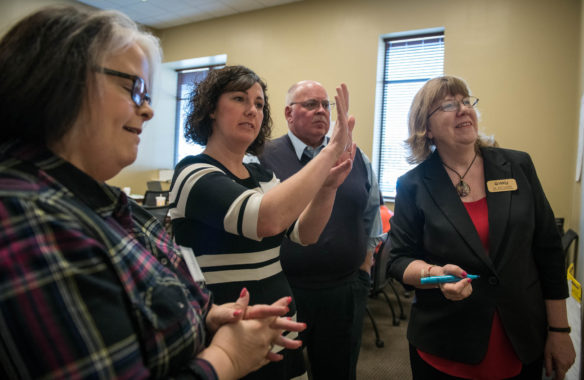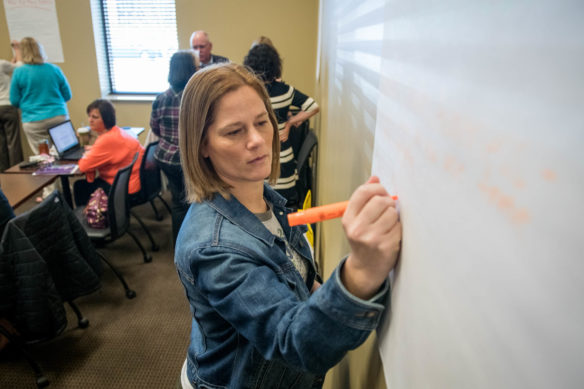
Tiffany Gruen, an instructional coach and gifted and talented teacher at Erlanger-Elsmere Independent School District, center, works with the 13-member Review and Development Committee during the writing of proposed new Kentucky Academic Standards for Social Studies. Feedback on the draft standards will be collected by the Appalachia Regional Comprehensive Center through Sept. 27.
Photo by Bobby Ellis, April 12, 2018
By Staff
The Kentucky Department of Education (KDE) has released a draft of the 2018 Kentucky Academic Standards for Social Studies and is now accepting public comments. Feedback on the draft social studies standards will be collected by the Appalachia Regional Comprehensive Center through Sept. 27.
Social studies is one of the academic standards to be reviewed and revised under a new process laid out in Senate Bill 1 (2017). The law prescribes a series of committees – made up primarily of Kentucky educators – to write and review the standards, which ultimately will be voted on by the Kentucky Board of Education (KBE) and approved by the legislature.
Academic standards represent what K-12 public school students should know and be able to do at each grade level. Under the new process, one or two content areas are scheduled to be reviewed each year and every six years thereafter on a rotating basis.
“We began this process back in January, when we opened up the current Kentucky Academic Standards for Social Studies for public comment,” said Lauren Gallicchio, KDE’s social studies consultant. “That was a very valuable process, with 267 people taking the time to give us thoughtful comments that have helped inform the revisions.”
The data from the initial public comment period indicated several ideas, such as:
- Students learn best when skills and knowledge are integrated.
- Each student is capable of impacting their communities in a positive way.
- Student inquiry is at the core of deep learning and understanding.
Starting in March, the 31-member Social Studies Standards Advisory Panel (AP) and the 13-member Review and Development Committee (RDC) – both made up of teachers, postsecondary education representatives and members of the business community – began a series of meetings to review and revise the standards.
Nicole Clements, a social studies teacher at Webster County High School and member of the RDC committee, said she was honored to be able to participate in drafting the standards.
“I hope this results in a set of standards that are not only teacher friendly, but kid friendly,” Clements said. “And by the time my kids in high school leave me, I won’t have any concerns that they’re not ready civically to make sound judgments.”

Nicole Clements, a teacher at Webster County High, takes part in a conference about writing new social studies standards. Starting in March, the 31-member Social Studies Standards Advisory Panel and the 13-member Review and Development Committee – both made up of teachers, postsecondary education representatives and members of the business community – began a series of meetings to review and revise the standards.
Photo by Bobby Ellis, April 12, 2018
RDC member Tiffany Gruen, an instructional coach and gifted and talented teacher at Erlanger-Elsmere Independent, said she hopes the new standards will result in students who will feel empowered to be more engaged in civic life.
“I love seeing students empowered to make change in their community,” Gruen said. “Students should be able to identify a problem and then have the skills and the wherewithal to create the solution. I really feel that begins with our social studies instruction in the classroom starting from kindergarten on.”
Gruen said she wants to see social studies taught in the earliest grades so that students have a foundation for deeper learning.
“We have to start with our youngest learners and build from there,” she said, “that’s why I love being part of the social studies standards work.”
Gallicchio said the proposed standards strike a balance between skills and content.
“The writing committees really listened to the concerns of the social studies community and produced standards that include inquiry and concept standards,” she said. “Within this document, students engage in four inquiry practices – questioning, investigating, using evidence and communicating conclusions.
“When students engage with the investigation standards, they learn about key social studies concepts within the four disciplinary lenses of civics, economics, geography and history. They include the critical thinking and problem-solving skills students need in order to be engaged citizens in their community and to be transition ready to compete for today’s most rewarding jobs.”
Gallicchio said the design of these new social studies standards is different than in the past.
“One of the new design features is that they outline what students should know and be able to do at each grade level from kindergarten through grade 8, rather than being organized by spans of grades in primary,” she said. “By outlining standards for each grade K-8, the writing committee wanted to give teachers more guidance on what social studies education should look like in the primary grades. In grades 9 through 12, the draft standards are organized by the discipline strand – civics, economics, geography and history – within the social studies.”
Additionally, Gallicchio said that the proposed standards weave in Kentucky studies, where appropriate, through a child’s social studies education K-12. The current social studies standards require students to focus on Kentucky studies in 4th grade.
“While the proposed standards still have students focusing on their local and regional communities in elementary school, they now engage in these studies earlier within the specific grade-level standards,” she said. “The committee also wanted students to continually engage in Kentucky studies throughout their K-12 social studies education. As a result, Kentucky standards are woven throughout the standards, requiring students to connect larger disciplinary concepts to Kentucky from elementary to high school.”
After the public comments have been received, the Advisory Panel and Review and Development committee will thoughtfully consider feedback and make any recommended changes to the proposed standards. After this review, they will be presented to the legislature’s Interim Joint Committee on Education. Gallicchio said she tentatively expects that to happen later this year.
The standards then will be reviewed by the Standards and Assessments Process Review Committee, which is made up of the commissioner of education, or his designee, as a non-voting member and three voting members who are to be selected by the KBE. If the committee agrees the correct process was followed and stakeholders had adequate opportunity for input, then the KBE would vote on the new standards. That vote could happen as early as this winter
“High quality social studies standards allow educators to challenge students, and to engage them in higher-order thinking and reasoning using the content knowledge acquired,” Gallicchio said. “The aim of the writing committee was to draft standards that provided students at all grade levels the opportunity to move beyond understanding content and begin engaging with and thinking like economists, geographers, historians and political scientists. The committee was dedicated to drafting standards that allow students to apply what they have learned in the classroom to support their communities as active and informed citizens.”
MORE INFO …
Lauren Gallicchio Lauren.gallicchio@education.ky.gov
Nicole Clements nicole.clements@webster.kyschools.us
Tiffany Gruen Tiffany.Gruen@Erlanger.kyschools.us



Leave A Comment